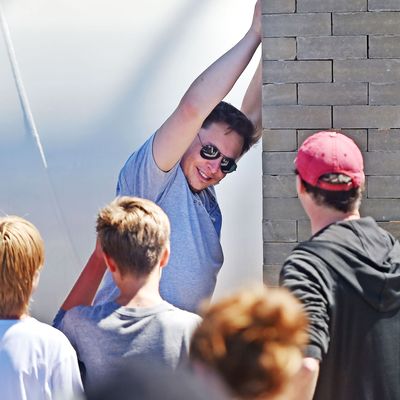
Elon Musk, the billionaire electric-car salesman and sworn enemy of Azealia Banks, recently exhorted his followers on Twitter to “read Eliot’s notes on The Waste Land”:
It would be an exhausting task to limn this tweet for substance, and yet what is the internet for if not exhaustion? And also, for showing off that you have read “The Waste Land”? On Breitbart, John Carney suggests that Musk “may very well see himself with his hand upon the wheel, sails up and headed seaward. Perhaps he will meet the fate of Phlebas but even in that there is beauty and nobility.” Hmm. Indeed.
At Slate, Felix Salmon proposes an alternate theory:
But there’s a much simpler and more elegant explanation, which is that this is all part of the breakup between Musk and his (ex?) girlfriend, Grimes. Here’s a hypothetical yet credible sequence of events: First, Grimes sends Musk the screenshot in question. As a message from Grimes to Musk, the excerpt makes much more sense: She’s telling him to get over himself, that he too will go the way of Phlebas.
National Review Online’s Kevin Williamson, for his part, muses that Musk is “seeking solace in poetry,” before listing, one by one, nearly every work referenced in “The Waste Land,” presumably to ensure that the reader is aware that Williamson has read not just “The Waste Land” but also, at the very least, its Wikipedia page. Williamson writes:
As Eliot suggests, it’s impossible to know exactly what someone else’s interior life is like. He did believe that it was possible to finesse that, a bit, through art and literature, believing that the artist could isolate an emotion and assemble “a set of objects, a situation, a chain of events which shall be the formula of that particular emotion.” Read strictly (formula?), that’s a little bit quacky. But reading “The Waste-Land” does produce a unique sensation. It does in me, anyway. Presumably it does in Musk, too, which is what he was hoping to share.
Ah. Yes. Hmm. Indeed.
I would personally hate to deny anyone the chance to show off their high-culture bona fides. But I think there is a simpler reason that Musk is tweeting about “The Waste Land,” and the reason is that the verse he is quoting is the source of the titles of two novels from his favorite sci-fi series: Consider Phlebas and Look to Windward, both by the late Scottish author Iain M. Banks. Both books concern a galaxy-spanning humanoid society called “The Culture,” which has reached a state of technological, social, sexual, and political advancement that might be best described as “fully automated luxury gay space communism.” (If anything is going to produce a unique sensation in Kevin Williamson, it’s these books.)
Musk has spoken frequently about his love for Banks’s Culture books before, and sparred with Twitter uses about their political implications. (When Musk, who opposes the formation of a union at his Tesla factory, described himself as a Culture-style “utopian anarchist,” other science-fiction writers pointed out that Banks, who died in 2013, was an “ardent trade unionist.”) In 2015, he recommended Excession as a “summer read.”
That Musk is quoting from the specific bit of “The Waste Land” that contains the titles to his favorite books obviously doesn’t mean that he doesn’t connect in some soul-enriching way to the poem itself. But the danger of trying to read deeply into tweets is that they often come from, and are intended for, contexts vastly different than those you are familiar with. Maybe Grimes sent it to him. Maybe he turns to poetry in times of tribulation. Maybe he just Googled “Consider Phlebas” and thought what he found sounded cool.





























